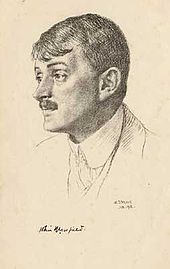John Masefield
John Edward Masefield (born June 1, 1878 in Ledbury , Herefordshire ; † May 12, 1967 in Abingdon , Oxfordshire ) was a British author who is best known for his realistic to mystical poetry. From 1930 until his death, Masefield was a Poet Laureate for the British Crown .
Live and act
John Masefield was born in a rural region in the west of England on the border with Wales to a lawyer and attended the traditional boarding school King's School in Warwick , from which he fled shortly before his 13th birthday. He was hired shortly afterwards on the training ship HMS Conway of the Royal Navy , where he was trained as a junior officer . Up to the age of 21 he mainly sailed the Atlantic on passenger ships and worked in various countries before he had to return to England in 1897 due to an illness. Here he began his literary work.
His first collection of poems, Saltwater Ballads, from 1902 (published in 1951 as " Saltwater Ballads ") describes life at sea and in distant countries in rough, realistic language and established Masefield's reputation as a chronicler of sailors and vagabonds. From the collection, the poem Sea Fever , a homage to the classic work The Seafarer , made it into English school books and the literary canon . Several poems in the collection were set to music by John Ireland , Rebecca Clarke and Gerard Boedijn .
In the years 1911–1913 he published an epic poem: The everlasting Mercy about the conversion of a poacher and drunkard, The Widow in the Byestreet about a young man who failed in love and his desperate mother and The Dauber about an amateur painter, the it is not possible to bring the sea in its reality onto the canvas. An authoritative study of the life and work of William Shakespeare also appeared in 1911. These works brought Masefield to the Academic Committee of the Royal Society of Literature (1913).
During the First World War Masefield served as a volunteer paramedic, after the war he settled in Oxford and processed his war experiences, particularly in the Battle of the Somme in The Old Front Line . In 1919, the expressive description of the fox hunt Reynard the Fox appeared . In the following years Masefield experimented with dramatic works and wrote two mystically influenced children's books The Midnight Folk (German " The Midnight Folk ") and The Box of Delights (German "The Wonderful Box ") (filmed by the BBC). In addition, Masefield wrote some realistic adventure novels such as The Bird of Dawning (1933, dt. " The Golden Cockerel ") and two other works on war themes: Gallipoli (1916) and The Nine Days Wonder (1941) about the Battle of Dunkirk .
In addition, from 1918 John Masefield was a member of the jury for the award of the Hawthornden Prize , the oldest literary prize in Great Britain.
He created the drama The Coming of Christ for the first Canterbury Festival in 1929, initiated by the Provost George Bell at the time , which saw five successful performances at Canterbury Cathedral with music by Gustav Holst .
In 1930 he was appointed Poet Laureate , the national poet of the United Kingdom, by King George V and composed poems for official occasions on behalf of the Crown. Also in 1930 he was elected an honorary member of the American Academy of Arts and Letters .
Masefield reported on his life in three autobiographical works: In the Mill (1941), So Long to Learn (1952), and Grace Before Plowing (1966).
Masefield lived in Burcot from 1932 until his death . His house burned down shortly after his death.
John Masefield is buried in Poets' Corner at Westminster Abbey .
Quote
"I must down to the seas again, to the lonely sea and the sky,
And all I ask is a tall ship and a star to steer her by ..."
"I have to go back down to the sea, to the lonely sea and the sky.
And I only need a big ship and a star to steer by ..."
Web links
- Literature by and about John Masefield in the catalog of the German National Library
- Newspaper article about John Masefield in the 20th century press kit of the ZBW - Leibniz Information Center for Economics .
- Works by John Masefield in the English Project Gutenberg
- Masefields Saltwater Ballads (PDF) in the Internet Archive (English; 2.79 MB)
Individual evidence
- ↑ Henry Seidel Canby (Ed.): Saturday Review. Volume 6. Saturday Review Associates, 1929, p. 1161.
- ^ JC Squire, Rolfe Arnold Scott-James: The London Mercury. Volume 33. Field Press Limited, 1936, p. 102.
- ^ Honorary Members: John Masefield. American Academy of Arts and Letters, accessed March 15, 2019 .
- ↑ Stock Photo: John Masefield (1878–1967) English poet at his home Burcote Brook near Abingdon in 1940. Alamy.com, accessed January 6, 2016 .
- ↑ Christopher Winn: I Never Knew That about the River Thames. London, Ebury Press, 2010 ISBN 978-0-09-193357-9 , p. 65.
- ↑ This verse of the poem is widely regarded as the origin of the modern English expression "tall ship" (for a larger sailing ship of traditional construction); in this poem itself, therefore, a more literal meaning of the expression is suggested.
| personal data | |
|---|---|
| SURNAME | Masefield, John |
| ALTERNATIVE NAMES | Masefield, John Edward (full name) |
| BRIEF DESCRIPTION | British writer |
| DATE OF BIRTH | June 1, 1878 |
| PLACE OF BIRTH | Ledbury , Herefordshire |
| DATE OF DEATH | May 12, 1967 |
| Place of death | Abingdon , Oxfordshire |
